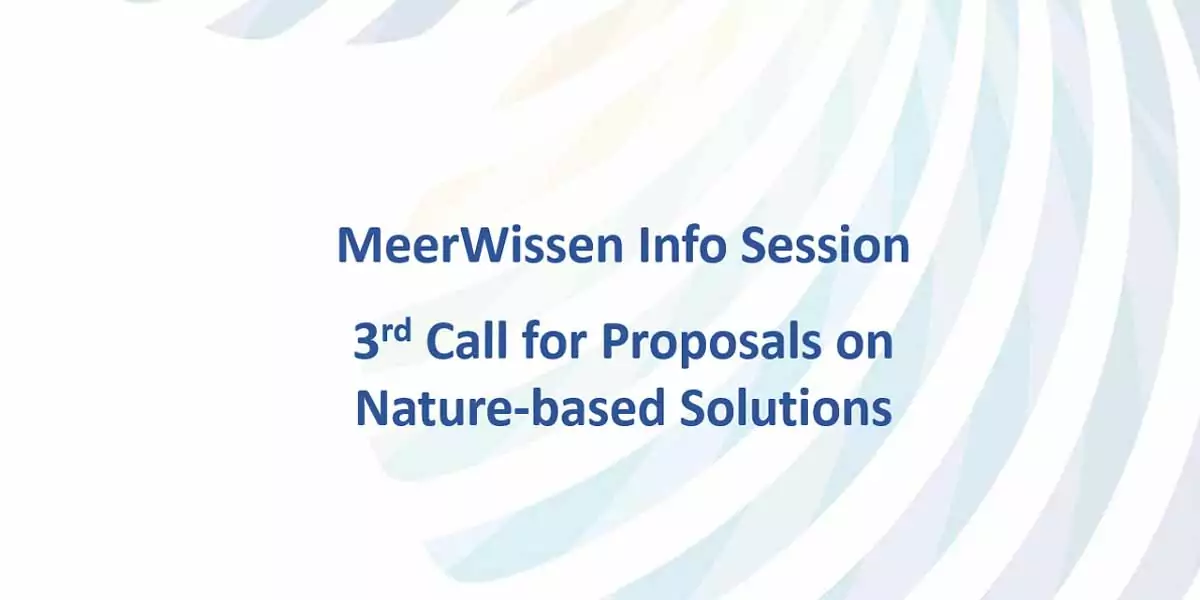The MeerWissen Initiative hosted a lively Information Session on the 20th of October regarding the recently launched 3rd Call for Proposals on marine and coastal Nature-based Solutions. More than 70 participants were informed about the MeerWissen funding programme, the 3rd Call for Proposals on Nature-based Solutions and the Guidance on Co-design. The Information Session highlighted the importance of a Co-design approach for solution-oriented research to ensure that project partners are jointly setting priorities and that outcomes meet local needs and can be used by all partners as well as decision-makers.
The opening speech by Silke Spohn, Head of Programme “Conservation of Biodiversity” at Deutsche Gesellschaft für Internationale Zusammenarbeit GIZ highlighted the nexus between ocean, biodiversity, climate and human-well-being. She pointet out that so-called “Nature-based Solutions” actions to protect, sustainably manage or restore marine ecosystems must be rooted in sound scientific knowledge and information.
Silke Spohn officially declared this Call as launched and motivated all African and German marine research institutes to respond to this call with innovative ocean science solutions.
The welcome note by Dr. Heike Henn, Director for Climate Policy, Energy, Urban development and Environment, and Commissioner for climate policy and climate financing at the German Federal Ministry for Economic Cooperation and Development (BMZ) focused on the continued progress made by the MeerWissen initiative and its 12 projects in 7 African countries. MeerWissen is a success story that must be continued, according to Henn. She underlined that we have to scale up our commitments to protect marine and coastal biodiversity and to combat the effects of climate change. Henn showed by using the FIDEA project that MeerWissen projects demonstrate how knowledge transfer between science and policy is being enhanced. MeerWissen represents close collaboration between marine research with decision-makers at both policy and management level. Henn mentioned that partnerships of equals are key to provide tailored, up-to-date and accurate science-based information to effectively protect and manage marine resources.
One element for the initiative to bring more impetus is the endorsement of this call as a contribution to the UN Decade of Ocean Science for Sustainable Development. In line with the objectives of the Decade MeerWissen place particular emphasis on co-designing research not only among the partnering research institutions, but also with non-academic stakeholders and decision-makers. Successful projects will be endorsed as Decade Actions and formally recognised as part of the Ocean Decade. Alison Clausen, Programme Specialist at Intergovernmental Oceanographic Commission UNESCO , introduced the 3rd Call for Proposals as a contribution to the UN Ocean Decade and informed about the challenges, objectives and actions of the Ocean Decade. A key element of the Ocean Decade is the Global Stakeholder Forum that can help to find partners and ideas for Decade Actions.
In the first input session Alexandra van Hoek and Ron Flügel, Advisors of the Marine Conservation Programme at Deutsche Gesellschaft für Internationale Zusammenarbeit GIZ gave insights into the MeerWissen Initiative itself, the Manual on the 3rd Call for Propsals, the funding programme and the topic “Nature-based Solutions”.
The second input was about the new Guidance on Co-design. Prof. Dr. Marie Fujitani, Research Group Leader, and Rebecca Lahl, Head of Office for Knowledge Exchange, both working at Leibniz Center for Tropical Marine Research (ZMT), gave a deep insight into the guidelines for Co-designing joint marine research projects in a dedicated Co-design phase prior to project implementation. They launched a new opportunity for Co-design in a dedicated phase. Fujitani and Lahl informed the participants how the guidelines have evolved and how they are applied. They explained shortly the four parts of the guidance: joint vision and common understanding, stakeholder engagement, project and partnership management and sustainability. The Co-design guidance was drafted for the purpose of inspiring and guiding all MeerWissen applicants along their endeavours of creating and planning new transdisciplinary research projects attuned to local needs and from a foundation of a strong partnership of equals. The guidelines are a “living document” to be supplemented with the experiences of all successful applicants of the current third call for proposals.
During the third input Dr. Corrine Almeida, biological oceanographer at the Institute of Engineering and Marine Sciences at the Atlantic Technical University and Dr. Heino Fock, Fisheries biologist at the Thünen Institute of Sea Fisheries, Bremerhaven, introduced into their project “Coastal Ecosystem Monitoring in Cabo Verde” and shared their practical experiences and lessons learned of the Co-design process around the joint project. A take home message is that project partners have to make sure that all relevant stakeholder groups are involved to facilitate a broad societal acceptance.
Finishing up the official part of the Info Session, Christof Weigelmeier, Senior Policy Officer for marine conservation at the German Federal Ministry for Economic Cooperation and Development (BMZ), highlighted the importance of MeerWissen as an important contributor to improving the ocean’s declining health. Weigelmeier underlined that BMZ through MeerWissen wants to further strengthen the ocean science capacities and foster a transfer of knowledge from strong scientific partnerships between Germany and Africa. He mentioned that the Ocean Decade is a reminder that the clock is ticking for effective protection of our ocean, seas and coasts. “We have a responsibility to do our level best to create a future where we conserve our oceans and still be able to benefit from them”, said Weigelmeier.
After the official part, interested participants were given the opportunity to introduce themselves and present their field of work. The “Meet & Greet” was welcomed by many scientists from African and German research institutes. In this open forum, the scientists of various institutes exchanged project ideas and searched for suitable partnerships for the 3rd Call for Proposals on marine Nature-based Solutions.
The event was jointly organised by the German Federal Ministry for Economic Cooperation and Development (BMZ) and the Deutsche Gesellschaft für Internationale Zusammenarbeit (GIZ), which hosts the MeerWissen Secretariat.

